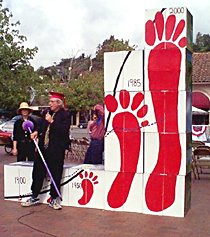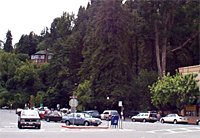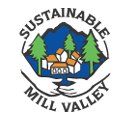






 |
 |
A Tutorial: A Sustainable Mill Valley Takes Shape
Ecological Footprint
The ecological footprint measures our impact on the environment in terms of resources consumed and pollution produced.
- The average American uses 25 acres to support his or her current lifestyle.
- The average Canadian uses 18 acres.
- The average Italian uses 10 acres.
How Much Can Nature Provide?
Nature provides an average of 5 acres of bioproductive space for every person in the world at current population levels.
Humanity's footprint is already over 30% larger than what nature can provide. At our current level of growth, by the year 2050, the world population will be 10 billion!
How Big is Your Footprint?
Calculate the size of YOUR ecological footprint and more resources at the Cars Direct web site.
Turn the Tide
Turn the Tide's recommended Nine Actions, as listed on the Center for a New American Dream's Turn the Tide Web site:
- Skip a car trip each week: If only 1,000 of us take this action, we will prevent nearly a million pounds of carbon dioxide from being released into the atmosphere each year.
- Skip a beef meal each week: If only 1,000 of us take this action, we will save over 70,000 pounds of grain, 70,000 pounds of topsoil and 40 million gallons of water each year.
- Don't eat shrimp, as methods to catch it accidentally kill other sea and air dwellers: Today, nearly 70 percent of the world's fisheries are fully fished or over-fished, and about 60 billion pounds of fish, sharks, and seabirds die each year as "by-catch" - animals caught accidentally as a result of wasteful fishing techniques. If only 1,000 of us stop eating shrimp, we can save over 12,000 pounds of sea life this year alone.
- Get off junk mail mailing lists: If only 1,000 of us succeed in halving our personal bulk mail, we will save 170 trees, nearly 46 pounds of carbon dioxide, and 70,000 gallons of water each year. You can begin to declare your independence by using the online form to get yourself off junk mail lists.
- Install four energy-efficient lightbulbs (CFLs): If only 1,000 of us each replace four standard bulbs with low-mercury CFLs, we can prevent the emission of five million pounds of carbon dioxide and reduce our electricity bills by more than $100,000 over the lives of those bulbs.
- Move the thermostat 3¡ F: If only 1,000 of us shift our thermostats three degrees (down in winter, up in summer), we will save over a million pounds of carbon dioxide emissions each year.
- Eliminate lawn and garden pesticides: If only 1,000 of us stop using pesticides on our gardens and lawns, we'll protect the environment from 950 pounds of toxins each year.
- Install efficient showerheads and low-flow faucet aerators: If only 1,000 of us install faucet aerators and efficient showerheads, we can save nearly 8 million gallons of water and prevent over 450,000 pounds of carbon dioxide emissions each year!
- Convince two friends: Just pass a copy of this list to receptive friends or tell them to get their own personal workspace at the Center for a New American Dream.

A Tutorial: A Sustainable Mill Valley Takes Shape...
Transportation
Energy
Water
Community
Organic Food
Housing
Support Local Business
Natural Environment
Reduce Pesticides
Ecological Footprint |
 |


During Mill Valley's Centennial Celebration
in September, 2000, Sustainable Mill Valley
created a pictorial representation of the
United States' ecological footprint in
different years.

If only 1,000 of us skip one car trip each
week, we will prevent nearly one million
pounds of carbon dioxide from being
released into the atmosphere each year.

These black-tailed deer in a Mill Valley yard can be poisoned by our use of lawn and garden pesticides. Sharing the outdoors with our animal friends is selfless and benefits all of nature. |







